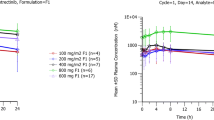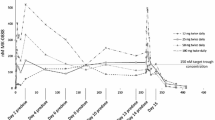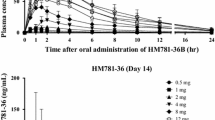Abstract
Background
The objective of the five clinical studies presented in this article was to investigate the single-dose pharmacokinetics of gefitinib (IRESSA®, ZD1839), an epidermal growth factor receptor (EGFR) tyrosine kinase inhibitor, in healthy volunteers and patients with advanced cancer.
Methods
Studies 1 and 3–5 recruited healthy male volunteers aged 18–65 years; study 2 recruited male or female patients aged ≥18 years with any solid malignant tumour expressing EGFR and refractory to standard therapy. Gefitinib administration was as follows: study 1 (bioavailability in healthy volunteers; n = 12) — intravenous infusion of 50 or 100mg followed by a single oral dose of 250mg; study 2 (bioavailability in cancer patients; n = 19) — intravenous infusion of 50mg followed by a single oral dose of 250mg; study 3 (intrasubject variability; n = 24) — two single oral doses of 250mg; study 4 (dose-proportionality; n = 15) — three single oral doses of 50–500mg; study 5 (effect of food; n = 26) — two single doses of 250mg under either fed or fasted conditions. In all studies, venous blood samples for determination of gefitinib plasma concentrations were collected at predetermined intervals. Plasma concentrations of gefitinib were measured using liquid-liquid extraction after basification followed by high-performance liquid chromatography with tandem mass spectrometric detection. Appropriate pharmacokinetic parameters were determined by noncompartmental methods.
Results
Study 1: Oral bioavailability of a gefitinib 250mg dose was 57% in healthy volunteers. Absorption was moderately slow, with geometric mean (gmean) peak plasma concentration (Cmax) of 85 ng/mL (range 43.5–110 ng/mL) reached 5 hours following an oral dose of 250mg. Study 2: Oral bioavailability of a gefitinib 250mg dose was 59% in patients. Absorption was again moderately slow, with gmean Cmax of 159 ng/mL (range 48.7–324 ng/mL) typically reached 3 hours (range 1–8 hours) following an oral dose of 250mg. Study 3: Area under the plasma concentration-time curve from time zero to infinity (AUC∞) and Cmax were variable — up to 15-fold between subjects and 2-fold within an individual. Study 4: AUC∞ and Cmax increased with dose across the range of 50–500mg, and increased dose-proportionally up to 250mg. Study 5: Small, clinically insignificant increases in AUC∞ and Cmax were seen in the presence of food (32% and 37%, respectively).
Conclusions
The gefitinib 250mg tablet is orally bioavailable in both healthy volunteers and cancer patients; bioavailability is independent of dose and unaffected by food to any clinically significant extent. Gefitinib undergoes rapid plasma clearance and has an extensive volume of distribution, resulting in a pharmacokinetic profile supportive of a once-daily dosage regimen.











Similar content being viewed by others
Notes
The use of trade names is for product identification purposes only and does not imply endorsement.
References
Woodburn JR. The epidermal growth factor receptor and its inhibition in cancer therapy. Pharmacol Ther 1999; 82: 241–50
Salomon DS, Brandt R, Ciardiello F, et al. Epidermal growth factor-related peptides and their receptors in human malignancies. Crit Rev Oncol Hematol 1995; 19: 183–232
Wells A. Molecules in focus: EGF receptor. Int J Biochem Cell Biol 1999; 31: 637–43
Chen Z, Ke LD, Yuan XH, et al. Correlation of cisplatin sensitivity with differential alteration of EGFR expression in head and neck cancer cells. Anticancer Res 2000; 20: 899–902
Fox SB, Harris AL. The epidermal growth factor receptor in breast cancer. J Mammary Gland Biol Neoplasia 1997; 2: 131–41
Barker AJ, Gibson KH, Grundy W, et al. Studies leading to the identification of ZD1839 (IRESSA™): an orally active, selective epidermal growth factor receptor tyrosine kinase inhibitor targeted to the treatment of cancer. Bioorg Med Chem Lett 2001; 11: 1911–4
She Y, Lee F, Chen J, et al. The epidermal growth factor receptor tyrosine kinase inhibitor ZD1839 selectively potentiates radiation response of human tumors in nude mice, with a marked improvement in therapeutic index. Clin Cancer Res 2003; 9: 3773–8
Sirotnak FM, Zakowski MF, Miller VA, et al. Efficacy of cytotoxic agents against human tumor xenografts is markedly enhanced by coadministration of ZD1839 (Iressa), an inhibitor of EGFR tyrosine kinase. Clin Cancer Res 2000; 6: 4885–92
Fukuoka M, Yano S, Giaccone G, et al. Multi-institutional randomized phase II trial of gefitinib for previously treated patients with advanced non-small-cell lung cancer. J Clin Oncol 2003; 21: 2237–46
Kris MG, Natale RB, Herbst RS, et al. Efficacy of gefitinib, an inhibitor of the epidermal growth factor receptor tyrosine kinase, in symptomatic patients with non-small cell lung cancer: a randomized trial. JAMA 2003; 290: 2149–58
Cohen MH, Williams GA, Sridhara R, et al. United States FDA drug approval summary: gefitinib (ZD1839; Iressa) tablets. Clin Cancer Res 2004; 10: 1212–8
Swaisland H, Laight A, Stafford L, et al. Pharmacokinetics and tolerability of the orally active selective epidermal growth factor receptor tyrosine kinase inhibitor ZD1839 in healthy volunteers. Clin Pharmacokinet 2001; 40: 297–306
Nakagawa K, Tamura T, Negoro S, et al. Phase I pharmacokinetic trial of the selective oral epidermal growth factor receptor tyrosine kinase inhibitor gefitinib (’Iressa’, ZD1839) in Japanese patients with solid malignant tumors. Ann Oncol 2003; 14: 922–30
Ranson M, Hammond LA, Ferry D, et al. ZD1839, a selective oral epidermal growth factor receptor-tyrosine kinase inhibitor, is well tolerated and active in patients with solid, malignant tumors: results of a phase I trial. J Clin Oncol 2002; 20: 2240–50
Baselga J, Rischin D, Ranson M, et al. Phase I safety, pharmacokinetic, and pharmacodynamic trial of ZD1839, a selective oral epidermal growth factor receptor tyrosine kinase inhibitor, in patients with five selected solid tumor types. J Clin Oncol 2002; 20: 4292–302
Herbst RS, Maddox A-M, Rothenberg ML, et al. Selective oral epidermal growth factor receptor tyrosine kinase inhibitor ZD1839 is generally well-tolerated and has activity in non-small-cell lung cancer and other solid tumors: results of a phase I trial. J Clin Oncol 2002; 20: 3815–25
Jones HK, Stafford LE, Swaisland HC, et al. A sensitive assay for ZD1839 (Iressa) in human plasma by liquid-liquid extraction and high performance liquid chromatography with mass spectrometric detection: validation and use in phase I clinical trials. J Pharm Biomed Anal 2002; 29: 221–8
Rowland M, Tozer TN. Clinical pharmacokinetics: concepts and applications. 3rd ed. Philadelphia (PA): Lippincott Williams and Wilkins, 1995: 161–7, 188–90
McKillop D, Hutchison M, Partridge EA, et al. Metabolic disposition of gefitinib, an epidermal growth factor receptor tyrosine kinase inhibitor in rat, dog and man. Xenobiotica 2004; 34: 917–34
Wakeling AE, Guy SP, Woodburn JR, et al. ZD1839 (Iressa): an orally active inhibitor of epidermal growth factor signalling with potential for cancer therapy. Cancer Res 2002; 62: 5749–54
Swaisland HC, Ranson M, Smith RP, et al. Pharmacokinetic drug interactions of gefitinib with rifampicin, itraconazole and metoprolol. Clin Pharmacokinet 2005; 44(10): 1067–81
Forrester LM, Henderson TJ, Glancey MJ, et al. Relative expression of cytochrome P450 isozymes in human liver and association with the metabolism of drugs and xenobiotics. Biochem J 1992; 281: 359–68
McKillop D, Stephens TC, Partridge EA, et al. The distribution of gefitinib (’Iressa’, ZD1839) into mouse xenograft tumours [poster]. 15th AACR-NCI-EORTC Symposium; 2003 Nov 17–21; Boston (MA)
Dressman JB. Comparison of canine and human gastrointestinal physiology. Pharm Res 1986; 3: 123–31
Dressman JB, Reppas C. In vitro-in vivo correlations for lipophilic, poorly water-soluble drugs. Eur J Pharm Sci 2000; 11 Suppl. 2: S73–80
Acknowledgements
The authors would like to acknowledge the analytical and technical support provided by Analytico Medinet BV, Breda, The Netherlands, and within the Drug Metabolism and Pharmacokinetics Department of AstraZeneca, Macclesfield, UK, for analysis of the plasma samples. We thank the research staff at the investigator sites and within the Experimental Medicines Department of AstraZeneca, Macclesfield, UK, for their participation in the conduct of the studies.
All studies reported here were funded by AstraZeneca and the authors have no conflicts of interest directly relevant to the content of this study.
Author information
Authors and Affiliations
Corresponding author
Rights and permissions
About this article
Cite this article
Swaisland, H.C., Smith, R.P., Laight, A. et al. Single-Dose Clinical Pharmacokinetic Studies of Gefitinib. Clin Pharmacokinet 44, 1165–1177 (2005). https://doi.org/10.2165/00003088-200544110-00004
Published:
Issue Date:
DOI: https://doi.org/10.2165/00003088-200544110-00004




